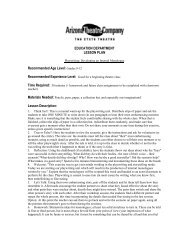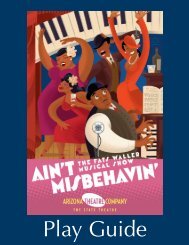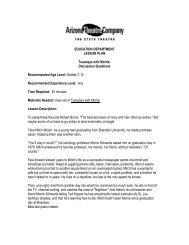Play Guide [1.2MB PDF] - Arizona Theatre Company
Play Guide [1.2MB PDF] - Arizona Theatre Company
Play Guide [1.2MB PDF] - Arizona Theatre Company
You also want an ePaper? Increase the reach of your titles
YUMPU automatically turns print PDFs into web optimized ePapers that Google loves.
SYMBOLISM<br />
SYMBOLISM IN THE GLASS MENAGERIE<br />
Tennessee Williams’s plays are known for his use of symbolism and poetic language<br />
used to describe the symbols used throughout. The Glass Menagerie is no exception<br />
to the rule; the play is rife with symbols, though some are more obvious than others.<br />
Below is a partial list of symbols found in the play. Can you fi nd others?<br />
Blue Roses: When Laura meets Jim, she reminds him that his<br />
high school nickname for her was “Blue Roses.” The nickname<br />
came about when Jim misheard Laura say she has “pleurosis” and<br />
believed she said “blue roses.” Blue roses do not occur in nature;<br />
they are therefore set apart from normal roses with colors like<br />
pink, red, white, etc. They are strange and do not fi t in with the<br />
crowd, much like Laura. Blue Roses is symbolically the perfect<br />
thing for Jim to call Laura as he comments how unlike other<br />
young women she is and how he thinks that is a good thing.<br />
Dance Hall: The dance hall across the street provides hours of entertainment for Tom as<br />
he listens to the music drifting up to the apartment and watches young couples leave the<br />
dance hall to kiss in a private corner of the alley. Tom’s unfulfi lled dreams and desires are<br />
represented by the dance hall that is right across the street from his house; like the dance<br />
hall his dream-life is close but just out of his reach. While he<br />
perceives the lives of the dance hall inhabitants as carefree<br />
and full of spirit and love, Tom feels his own life is bogged<br />
down with responsibility and a dead-end job. The dance hall<br />
represents all he is missing in his life.<br />
Fire Escape: The fi re escape that the characters use as an<br />
entrance and an exit to the apartment is a clear symbol of<br />
the escape that Tom plans throughout the play. In his stage<br />
directions, Tennessee Williams writes that the fi re is escape is<br />
“a structure whose name is a touch of accidental poetic truth,<br />
for all of these huge buildings are always burning with the<br />
slow and implacable fi res of human desperation.”<br />
Gentleman Caller: The gentleman caller (eventually called Jim) is symbolic of hopes<br />
and dreams. To Amanda, the gentlemen callers of her past represent all her potential<br />
for happiness in life that faded with her choice of the wrong gentleman caller to be her<br />
husband (who abandoned her). To Laura, the gentleman caller represents her chance at a<br />
“normal” life. He represents all that her mother desperately wishes her to fi nd but that she<br />
has failed at acquiring. In the fi rst scene of the play, Tom describes the gentleman caller as<br />
the symbol for “the long-delayed but always expected something that we live for.”<br />
The Glass Menagerie<br />
<strong>Arizona</strong> <strong>Theatre</strong> <strong>Company</strong> <strong>Play</strong> <strong>Guide</strong> 24


![Play Guide [1.2MB PDF] - Arizona Theatre Company](https://img.yumpu.com/11952176/24/500x640/play-guide-12mb-pdf-arizona-theatre-company.jpg)

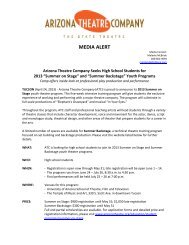
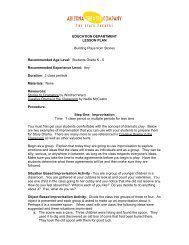

![Play Guide [356k PDF] - Arizona Theatre Company](https://img.yumpu.com/46218320/1/190x245/play-guide-356k-pdf-arizona-theatre-company.jpg?quality=85)
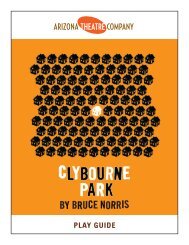
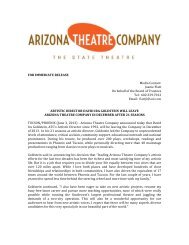


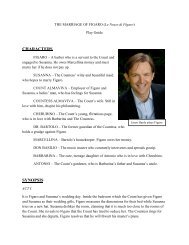
![[title of show] Arizona Theatre Company Play Guide 1](https://img.yumpu.com/24482689/1/190x245/title-of-show-arizona-theatre-company-play-guide-1.jpg?quality=85)
